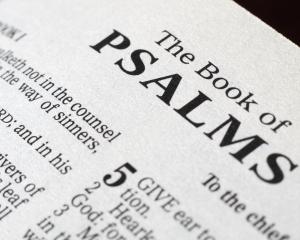The nature of community in the early church has lessons for today, writes Prof Paul Trebilco.
The Christians spoken of in the New Testament formed strong and close-knit groups.
The most frequent way in which members of the earliest churches addressed one another was as "brother and sister".
They were not biologically related, but they came to regard their group as a new family in which they shared the same sort of close relationships that were experienced between natural brothers and sisters.
They also had a very clear sense of identity as a group.
They were very focused on the person of Jesus, on his life and on what he had said and done.
They believed that the risen Jesus was with them as they gathered and that his death and resurrection had transformed them and their world.
They shared weekly in what they called "the Lord’s Supper", in which they repeated the supper that Jesus had shared with the disciples on the night before he died.
Another feature of their life together was that there were clear ways of joining the group.
The apostle Paul says that the Thessalonians "turned to God from idols, to serve a living and true God" (1 Thess 1:9-10), which is a way of speaking of conversion.
We know that baptism was connected with joining the group and that confession of Jesus as Lord was a key feature of their life.
The groups were also quite diverse.
They included Jew and non-Jew, and so bridged a key ethnic divide of the ancient world (Eph 2:11-22). Sometimes relationships between Jews and non-Jews ("Gentiles") were tense, or difficult (Acts 15:1-35).
But in their best times, the early Christians overcame the hostility between Jew and non-Jew and came to see themselves as one family because of what Christ had done.
Members included the rich and the poor, with a whole range in between.
Many were slaves, others were former slaves or were freeborn.
They experienced a real sense of unity and seem to have been able to incorporate differences, to appreciate different cultures and different ways of doing things.
Yet the earliest Christian groups were also very open to new members, and so were keen for outsiders to join their groups.
For example, outsiders — non-members — were regularly present at the early Christian meetings in Corinth (1 Cor 14:23-25). Doing good to non-members in all sorts of ways was important to them (Gal 6:10; 1 Thess 5:15), and a number of texts even speak of loving their enemies (Rom 12:21; 1 Pet 3:9), of whom there seem to have been a number.
These actions were not done simply to recruit new members.
They were simply committed to loving other people.
It is worth reflecting on this combination of features of group life in the early Church.
I think there is a challenge here both for church life today, and for our society in general.
The early Christians formed strong, tight-knit groups.
Yet their groups were very open to new members and were called upon to "love your enemies".
We see a strong sense of group identity with a clear sense of demarcation between insiders and outsiders and yet a strong openness to all non-members.
It is very easy for groups or societies to have a weak sense of belonging, with members feeling isolated or uninvolved in the group.
By contrast, groups or societies with a strong sense of identity are often closed to newcomers, hostile to "foreigners", with a strong sense of exclusiveness.
So being both a strong group with a clear sense of identity and open to "outsiders" is a considerable challenge.
This is certainly a challenge for the contemporary church.
But this is also a challenge for our society and for many other societies around the world.
The more we have a sense of "us", of who we are as a society (which is clearly important), the more we can feel closed to newcomers.
The challenge is to both be a society with a clear sense of identity and values, and have a real openness to and acceptance of newcomers and those who are different from us.
For the early Christians, the key matter was that they were a group because of what Christ had done for each of them.
This was the basis for their belonging together.
It was not because of something they had done, or just that they were particularly friendly people.
They all stood before the cross as those whom Christ loved, and for whom he had died.
On this basis, all differences, all sense of superiority to others (whether based on ethnicity, gender, wealth, status or anything else) vanished.
Because he had forgiven them, they could accept one another.
And because their message was for all — literally for everyone, no matter who they were — out of both conviction and gratitude, they were open to all comers.
- Paul Trebilco is professor of new testament studies in the department of theology and religion at the University of Otago.
Comments
Not being au fait with churching since the end of Loaves and Fishes (the cafe and the division), it seems if we regard people as individuals, without agenda, or as representative of some venal collective cause, while remaining circumspect enough to defend ourselves physically/spiritually, should our acquaintance go 'on the turn', we've got it really. The Book, with Concordance, is a bit big to carry around as reference.












